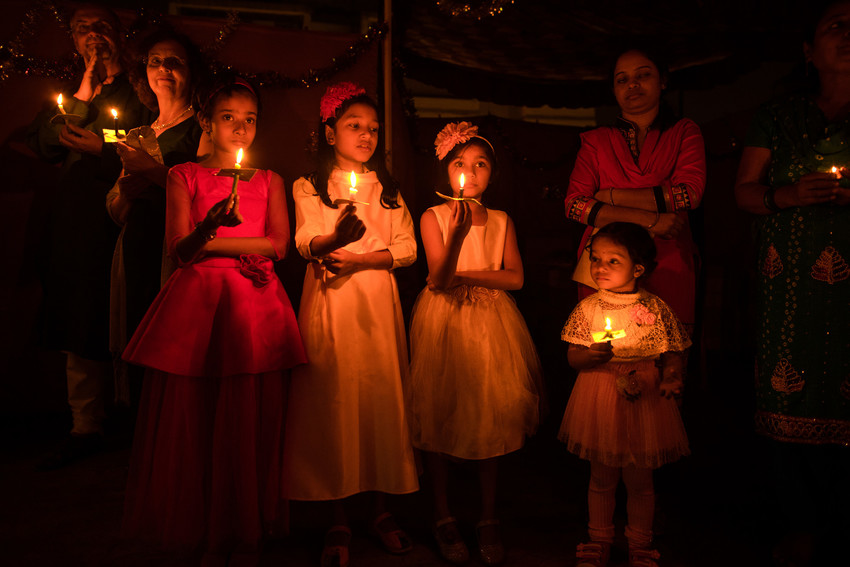The absurdity of Christmas

Christmas is coming. We light candles for Advent and prepare our hearts for a miracle. The songs, the trees, the moments of yearning and waiting, the knowledge there will be surprises on Christmas morning. I love it all, perhaps mostly for the predictability of knowing that some variation of all these things will happen in my December.
Yet that first “away in a manger” wasn’t scheduled. The zealots carefully planning out their revolution in Jerusalem and the Romans trying to control an occupied city didn’t include the birth of a baby in their strategic plans and to-do lists. Mary most certainly did not make sure to block off time on her calendar for a pregnancy out of wedlock, divine or otherwise. Joseph did not carefully prepare a set of talking points to bring to family gatherings about his plan to deliver a baby that probably wasn’t his in a stable in a city that used to be his home, but no longer was.
That first Christmas was a time of mystics, of dreams and visions, of God appearing in the least planned and most absurd ways. This year, as I read the gospels, from Jesus’ birth to the Sermon on the Mount, to Jesus’ death and resurrection, I’ve been struck less by the beauty and power of it all, and more by how absurdly bizarre the whole thing is. Every time we think something should go one way, the gospel flips it over on its head. Love your enemies. Do good to those who hate you. The last shall be first. Give away your coat and throw in a pair of pants for good measure.
In late November, I facilitated a gathering with Government of Canada public servants and civil society groups that include peacebuilding as part of their organization’s mandate, with a vision to find collective ways of working together. The most liberating part of the meeting was starting by simply admitting that what we were currently doing wasn’t working. Despite all our best efforts, the world is less peaceful than it was when our network was formed. It sounds counterintuitive, but being able to admit that things were broken and that we have no idea how to fix them was surprisingly freeing.
What if our invitation, in a broken world yearning for something different, is to take the lessons of that first Christmas to heart and embrace of actual absurdity of the upside-down kingdom? Our impulse is to do more of what we are good at doing: come up with a solution, a plan, a fix, the perfect talking points and the right vocabulary. At least this is true for my advocacy work! But what if that desire to get it right, to have all the information and all the answers, is part of what got us into this mess in the first place?
In our facilitated gathering, when we were all able to admit that we don’t have a way forward, we opened up a brave space to talk about trying something different. It was slow, but delightful work. We haven’t arrived yet, but we know the journey may look a little different than we had planned. There is liberation in stopping our efforts to find the right answers, the right talking points, and instead embracing doing something different. After all, we have very little to lose. We are already failing. Instead of being devastated by that fact, what would happen if we saw it as an invitation to creativity and imagination and the backdoor to the upside-down Kingdom of the gospel?
Journalist Amanda Ripely, in her investigative work around high conflict (when the conflict becomes the point, not the issues being discussed), found that breaking a cycle of high conflict usually involves doing something counterintuitive. She includes examples like displaying vulnerability instead of strength or engaging in a relationship building activity like taking doughnuts to a meeting that you know will be tense to show appreciation for the people present.
To me, this is the paradox of Christmas in action.
My invitation to myself, and to us all, is to take the lessons of Christmas to heart and practice doing something counterintuitive. Let’s allow ourselves to be unsettled, especially where we feel the most settled. Practice being centred in the midst of uncertainty. Listen where our impulse is to talk. Share our opinion instead of staying silent when we are nervous. Rather than sitting down for a conversation, go for walk. Ask a question when you are most convinced you have the answer. Get goofy when you want to be serious. Get serious when you want to make a joke. The list could go on, but now I’m curious. What does practicing a counterintuitive approach this Christmas look like for you?
Questions for Reflection and Action:
- Reflect on the story of Jesus, from his birth to resurrection. Do you see Jesus inviting us to step into the paradox of surprise and counterintuition? Why or why not?
- Practice doing something counterintuitive this week and building your muscles for doing something different. Try to make it fun. This could be something as straightforward as taking a different route to work or eating dessert before dinner.
- Now try to apply that to your approach to a challenging problem, be it an issue where you are working on large scale social change, or together with your family and friends. Is there one thing you could think of doing in the opposite way?
Top photo: MCC staff, along with their families, celebrated Christmas 2017 at MCC's office in Kolkata, India. MCC photo/Colin Vandenberg

